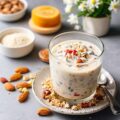Introduction to Halloumi: A Calcium-Rich Cheese for Better Bone Health
Halloumi, the beloved cheese from Cyprus, is not just a delicious treat – it’s also a fantastic source of calcium for supporting strong, healthy bones. This semi-hard, brined cheese made from a mixture of goat’s and sheep’s milk (and sometimes cow’s milk) is known for its high melting point, making it perfect for grilling or frying. But beyond its culinary versatility, halloumi packs a powerful nutritional punch, especially when it comes to calcium content.
In this article, we’ll explore the wonderful world of halloumi, its health benefits, and share some mouthwatering recipes that will not only tantalize your taste buds but also contribute to your daily calcium intake. Let’s embark on a flavorful journey that nourishes both body and soul!
The Nutritional Profile of Halloumi
Before we dive into the recipes, let’s take a closer look at what makes halloumi such a nutritional powerhouse:
- Calcium: A 100g serving of halloumi provides about 750mg of calcium, which is roughly 75% of the recommended daily intake for adults.
- Protein: Halloumi is high in protein, with about 22g per 100g serving, making it an excellent option for vegetarians and those looking to increase their protein intake.
- Vitamins and Minerals: It’s a good source of zinc, magnesium, vitamin A, and B vitamins.
- Healthy Fats: While halloumi is relatively high in fat, it contains beneficial fatty acids that are important for overall health.
Now that we understand why halloumi is so beneficial, let’s explore some delicious ways to incorporate it into your diet!
Grilled Halloumi and Vegetable Skewers
This colorful and nutritious dish is perfect for summer barbecues or as a quick weeknight dinner. Here’s what you’ll need:
- 250g halloumi, cut into cubes
- 1 red bell pepper, cut into chunks
- 1 yellow bell pepper, cut into chunks
- 1 zucchini, sliced
- 1 red onion, cut into wedges
- Cherry tomatoes
- Olive oil
- Lemon juice
- Dried oregano
- Salt and pepper to taste
Thread the halloumi and vegetables onto skewers, brush with a mixture of olive oil, lemon juice, and oregano, then grill until the cheese is golden and the vegetables are tender. Serve with a side of tzatziki for a complete Mediterranean-inspired meal.
Crispy Halloumi Salad with Pomegranate and Mint
This refreshing salad combines the saltiness of halloumi with the sweetness of pomegranate and the coolness of mint. Here’s how to make it:
- 250g halloumi, sliced
- Mixed salad greens
- 1/2 cup pomegranate seeds
- 1/4 cup fresh mint leaves
- 1/4 cup toasted pine nuts
- Balsamic vinaigrette
Pan-fry the halloumi slices until golden brown. Arrange the salad greens on a plate, top with the crispy halloumi, pomegranate seeds, mint leaves, and pine nuts. Drizzle with balsamic vinaigrette and enjoy this burst of flavors and textures.
Halloumi and Vegetable Frittata
This protein-packed frittata is perfect for brunch or a light dinner. Here’s what you need:
- 200g halloumi, grated
- 8 eggs
- 1 cup mixed vegetables (spinach, cherry tomatoes, bell peppers)
- 1/4 cup milk
- 1 tbsp olive oil
- Salt and pepper to taste
- Fresh herbs (basil, parsley) for garnish
Whisk the eggs with milk, salt, and pepper. Heat olive oil in an oven-safe skillet, add vegetables and cook until tender. Pour in the egg mixture, sprinkle grated halloumi on top, and cook on the stovetop for a few minutes. Finish cooking in the oven until set and golden. Garnish with fresh herbs before serving.
Halloumi and Watermelon Salad
This unexpected combination of salty halloumi and sweet watermelon is a refreshing treat for hot summer days. Here’s the recipe:
- 250g halloumi, cut into cubes
- 3 cups watermelon, cubed
- 1/4 cup fresh mint leaves
- 1/4 cup crumbled feta cheese
- 2 tbsp olive oil
- 1 tbsp balsamic vinegar
- Black pepper to taste
Grill or pan-fry the halloumi cubes until golden. In a large bowl, combine watermelon, grilled halloumi, mint, and feta. Drizzle with olive oil and balsamic vinegar, season with black pepper, and toss gently. This salad is best served immediately while the halloumi is still warm.
FAQ: Halloumi and Bone Health
Here are some frequently asked questions about halloumi and its role in bone health:
1. How much calcium does halloumi contain?
Halloumi is an excellent source of calcium, with approximately 750mg per 100g serving. This is about 75% of the recommended daily intake for adults.
2. Can lactose-intolerant individuals eat halloumi?
While halloumi does contain some lactose, it’s generally lower in lactose compared to other cheeses due to its production process. Some lactose-intolerant individuals may be able to tolerate small amounts, but it’s best to consult with a healthcare professional.
3. Is halloumi suitable for a vegetarian diet?
Yes, halloumi is vegetarian-friendly as it’s made from animal milk but doesn’t contain animal rennet. However, it’s not suitable for vegans.
4. How often can I include halloumi in my diet?
While halloumi is nutritious, it’s also high in sodium and fat. Enjoy it in moderation as part of a balanced diet, perhaps 1-2 times a week.
5. Are there any alternatives to halloumi for calcium intake?
Yes, other good sources of calcium include leafy greens like kale and spinach, sardines, tofu, and fortified plant-based milk. A varied diet ensures you get a range of nutrients for optimal bone health.
Incorporating calcium-rich foods like halloumi into your diet can be a delicious way to support bone health. Remember, a balanced diet, regular exercise, and a healthy lifestyle are key to maintaining strong bones throughout your life. Enjoy these halloumi recipes as part of your journey towards better health and wellbeing!









